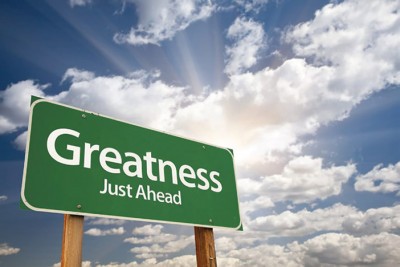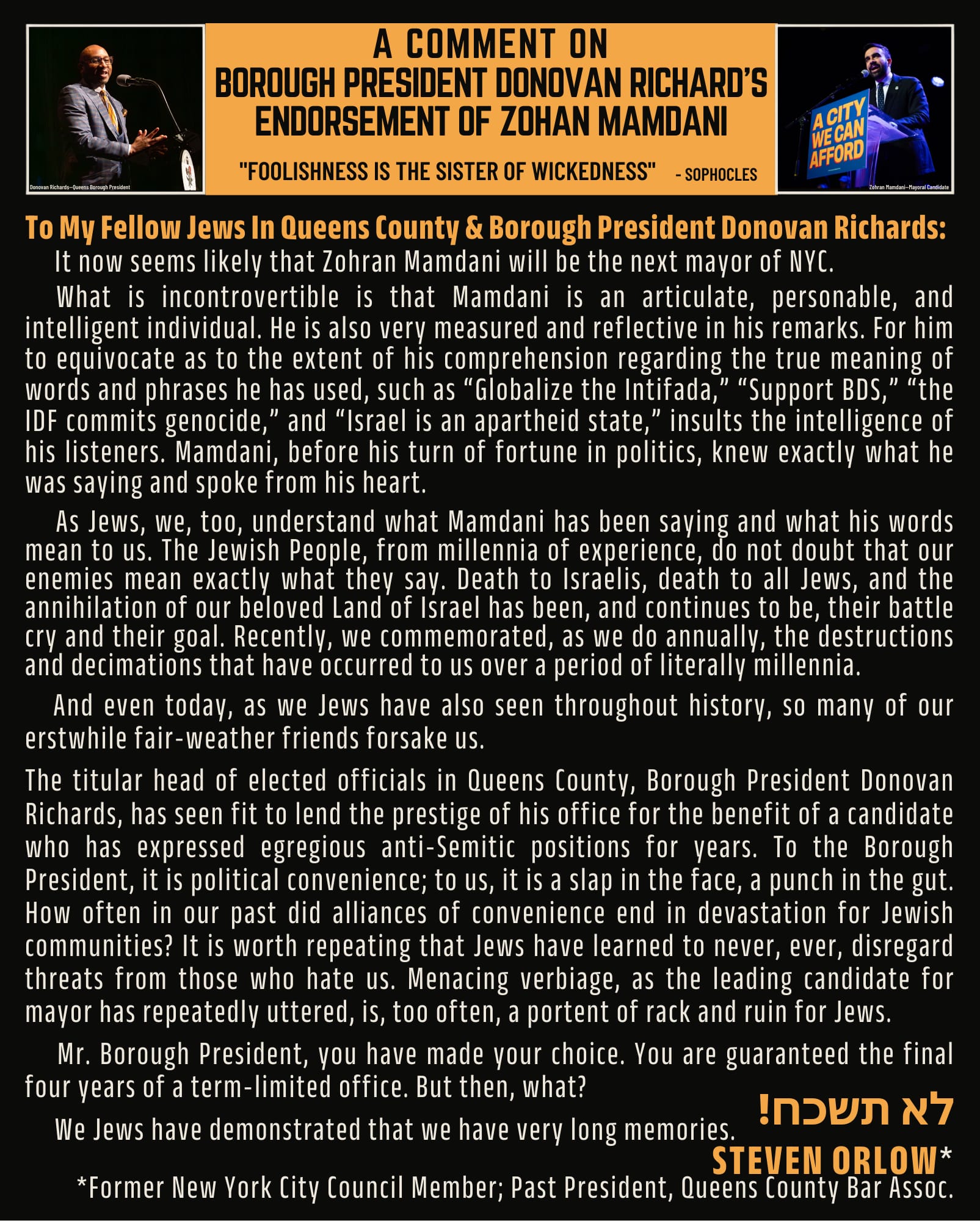
אֵ֚לֶּה תּֽוֹלְדֹ֣ת נֹ֔חַ נֹ֗חַ אִ֥ישׁ צַדִּ֛יק תָּמִ֥ים הָיָ֖ה בְּדֹֽרֹתָ֑יו
These are the generations of Noah, Noah was a righteous man in his generation.
Let us look at the importance and responsibility of taking care of a community. Whether our responsibility as Jews is simply to ensure that we follow the right path or whether we also have a responsibility vis-a-vis others, to do what we can to help them along the right path.
Ribbi Yohanan says in Sanhedrin (108a), בדרתיו, ולא בדורות אחרים. The Gematria of the word בדרתיו is 622. ולא בדורות אחרים equals 914. The difference between the two is 292.
Noah lived 350 years after the Mabbul (Bereshith 9:28) and Abraham Abinu, ‘a”h, was born 58 years before Noah died. If we subtract 58 from 350 we get 292. In other words, Noah was considered to be righteous until Abraham Abinu, ’a”h, was born. Once Abraham Abinu, ’a”h, came into the world, he was not considered to be righteous anymore.
There is the famous controversy about the greatness of Noah, in Bereshith Rabba, between Ribbi Yehudah and Ribbi Nehemiah. Ribbi Yehudah said that Noah was righteous in his generation, but had he lived in the generation of Moshe Rabbenu, ‘a”h, or Shemuel HaNabi, ‘a”h, he would not have been considered righteous.
Rabbenu the Alshikh, ‘a”h, comments that Moshe Rabbenu, ’a”h, would teach the people the laws of G-d, from morning till night, and guide them. Shemuel HaNabi, ‘a”h, used to go from city to city to guide the Benei Yisrael. Noah, on the other hand, didn’t reach out to others like they did.
Ribbi Nehemiah looked at it differently. His point of view was that if Noah was righteous in his generation, when he was surrounded by evil and corruption, how much more so would he have been righteous in the generations of Moshe Rabbenu or Shemuel HaNabi, ’a”h?
In Midrash Rabba it says that Noah told Moshe Rabbenu, ’a”h, “I am greater than you because I was saved from the Dor HaMabbul (generation of the great flood)”. Moshe Rabbenu, ’a”h, told Noah the following parable.
There were two captains who were each sailing in their ships. Something untoward happened to both ships. One captain saved himself but not his ship. The other captain saved both himself and his ship. Which captain was greater? Clearly, the one who saved his ship as well as himself is more praiseworthy.
In other words, the greatness of a man and a leader, is not just whether is a righteous or not, but also how he looks after his flock.
It says further (Bereshith 7:23):
כג ו??????? ???????????????? ? ?????? ? ?????????? ??????????? ????????? ???????????? ??????????? ?????????? ?????????? ????????? ???????????? ?????????? ?????????? ????????? ????? ????????ַיִּ֜מַח אֶת־כָּל־הַיְק֣וּם ׀ אֲשֶׁ֣ר ׀ עַל־פְּנֵ֣י הָֽאֲדָמָ֗ה מֵֽאָדָ֤ם עַד־בְּהֵמָה֙ עַד־רֶ֨מֶשׂ֙ וְעַד־ע֣וֹף הַשָּׁמַ֔יִם וַיִּמָּח֖וּ מִן־הָאָ֑רֶץ וַיִּשָּׁ֧אֶר אַךְ־נֹ֛חַ וַֽאֲשֶׁ֥ר אִתּ֖וֹ בַּתֵּבָֽה:
And He wiped out all living substance on the face of the earth, from man to beast, to crawling creatures and to birds in the sky, and they were wiped out from the earth, and all that remained was Noah and what was with him in the Ark.
It says in Barukh Ta’am that every other place where Noah is mentioned, he is mentioned with at least one adjective, such as Ish, Saddiq, Tamim, and so on. Here, however, he is mentioned as if the Torah is simply speaking about ordinary person. Why is this so?
He answers that as long as there were still other people living on earth, the Torah mentioned those adjectives which gave him honor, because his merits would, perhaps, protect his generation and save them. But now, that there was just him, it only uses his name without any adjective. In other words, his greatest potential was to be the shepherd to guide and care for his flock. Now that there was no more flock, his status was reduced to that of an ordinary person.
I saw the concept of looking after others of the community and reaching out to all and being available for them at all times, from up close, when I was a child. With your permission, I would like to share it with you.
My father, ’a”h, was descended from his father’s side from those who built Yeshiboth, Midrashim, places of learning and Synagogues throughout the world and in Baghdad (Babel), where they were based, in the days when it was a major center of learning which saw great Hakhamim including the Ben Ish Hai. They built institutions in the Land of Israel, in Sefath and in Jerusalem. More than 50% of the costs were paid by my ancestor, H”R Hesqel Reuben Menashi, ’a”h, for the Hurbah Synagogue in the old city. A plaque with his name attesting to this was on the wall of the Hurbah Synagogue for years. When the restoration was done recently, however, someone appeared to have deemed it fit to remove the plaque.
From his mother’s side he was descended from the Sassoon family, who also built great institutions of learning around the world, from Bombay to Kobe, Japan. My father, ’a”h, was named ’Abdallah Faraj Hayyim Menashe, also referred to as Albert Menashe, after his great uncle H”R ‘Abdallah Somekh, ‘a”h, the teacher of the Ben Ish Hai, and Sir Albert (‘Abdallah Sassoon).
The Sassoon Trusts in India ran three very large Synagogues built by the Sassoons, Keneseth Eliyahoo Synagogue, the Magen David Synagogue in Mumbai and the Ohel David Synagogue in Pune, as well as numerous charitable institutions, including a dispensary, youth associations and much much more.
He was the Hakham of the community which numbered 8,000 at one time, as well as Chairman and life-president of the Trusts. In addition to his responsibility as a husband and father, which I can tell you was over and above the call of duty, and we were all highly honored and privileged to have had the merit to have him, he literally hand-held the entire community.
He was there for every problem that anyone had. He was regularly in contact with Rabbanim and Bathei Din in Israel, England and other places. But above all, he saw to all the religious needs of the community. He created a religious youth movement, a Sabbath Observence League and much more. When the community in Bombay started moving to other areas, England, Canada, Australia, the United States, and after the formation of the State of Israel, to Eres Yisrael, he provided the necessary support mechanism. When the youth made ‘Aliyah to the Land of Israel, my father went on the first plane with them, ensuring that they were in placed in religious environments.
This is more significant that it seems. In Calcutta, a city far from Bombay, where my father was not involved, the youth, who all came from religious homes, were sent by the Shaliyah of the Youth ‘Aliyah from Israel, and the boys and girls were all placed in a non-religious Kibbutz. In fact, they learned later that the boys and girls were shocked and could not imagine that Jews in the Holy Land, could be nonobservant.
Only when the community had dwindled, did he, the captain of the ship, deem it appropriate to take us, his family and move to England.
We should note, that this responsibility is not just for leaders of communities, although the responsibility for them is obviously much greater. But, in fact, it is incumbent upon every Jew to not only look after himself, but after the well-being of all Kelal Yisrael, whom he can help or have a positive effect upon.
By Rabbi Ya’aqob Menashe
Rabbi Ya’aqob Menashe is a renowned author and lecturer, whose Shiurim continue to inspire thousands around the world. Many can be seen at www.NonstopTorah.com. His daily Torah Minutes are eagerly anticipated by thousands every morning. They can be seen at www.ATorahMinute.com. Rabbi Menashe is the spiritual leader of Midrash BEN ISH HAI. More information is available at the Midrash website, www. Midrash.org.
The Greatness Of A Man And A Leader, Is Not Just Whether He’s Righteous Or Not, But Also How He Looks After His Flock
Typography
- Smaller Small Medium Big Bigger
- Default Helvetica Segoe Georgia Times
- Reading Mode













